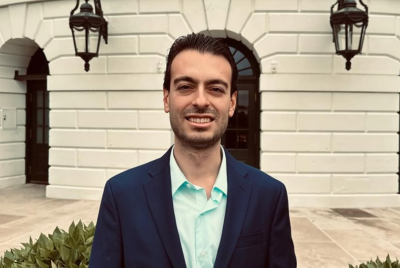British 'Tourists' Caught with 33kg of Cannabis in Spain Adding To List Of Brits Banged Up Abroad
The couple is unlikely to be identified until formal charges are pressed.

Two British nationals have been arrested in Spain after landing in the country with over 33 kilograms of vacuum-packed cannabis concealed in their luggage. The pair, who claimed to be arriving from Thailand for a holiday, were stopped by suspicious customs officers at Valencia Airport and now face serious drug trafficking charges. This incident follows an alarming pattern of tourists bringing cannabis into Spain, ignorant or apathetic to the country's laws and regulations. But what are these regulations, and is there any way to bypass them?
British Couple's Weed Stash Found Due to Jittery Behaviour
On 5 May, Spanish Civil Guard officers flagged the British couple for further inspection, citing a 'nervous and evasive attitude' during routine passenger checks. The man and woman, aged 33 and 34 respectively, were intercepted after disembarking a flight from France. Despite claiming they were tourists from Thailand with nothing to declare, officers were unconvinced.
A Civil Guard spokesperson later confirmed that the Civil Guard and Tax Agency 'arrested two people on a flight from France for carrying more than 33 kilograms of vacuum-packed marijuana in their suitcases.' Customs agents were immediately alarmed when scans of the couple's luggage revealed no clothing or personal belongings—only vacuum-sealed packages of a plant-based material, later confirmed to be cannabis.
The couple is not merely risking an early end to their vacation—they are facing criminal charges and, potentially, years behind bars.
The Couple's Legal Troubles Begin
The weary tourists appeared in court the next day to face drug trafficking charges, but an indictment could take months. They experienced a closed-door hearing, in accordance with Spanish legal procedure, where only trials are held in public. For now, they remain in prison amid ongoing investigations. Though their lawyers are expected to seek bail, the significant amount of cannabis the Brits were carrying will likely make their legal battle difficult.
In Spain, detainees can be jailed for up to two years before being tried, and a two-year extension must be approved by a judge. Though the couple might be extradited to the UK to face prosecution, their ordeal is far from over.
What Are Spain's Cannabis Laws?
Spain enforces strict penalties for drug trafficking, especially when large quantities or aggravating factors are involved. According to Article 368 of the Spanish Criminal Code, cultivating or transporting cannabis that promotes illegal consumption is punishable by a prison sentence of three to six years. However, what the couple in question will likely be charged with is drug possession or drug trafficking. In its most minor scale, the former leads to a fine of £443 (€601) to £22,126 (€30,000).
Minor drug trafficking offences result in prison sentences ranging from 1 to 3 years, standard offences carry penalties of 3 to 6 years, along with hefty fines, and aggravated trafficking can lead to sentences of 6 to 9 years and even steeper penalties. In Spain, the severity of the offence is not determined solely by the quantity of the drug; instead, it is assessed based on whether the crime involved organised operations or if the drug was supplied to minors.
If you are a tourist who uses medical cannabis, not all is lost. Tourists are allowed to legally carry medications containing narcotics or psychotropics—such as medical cannabis—if prior authorisation is granted. The permit application must be made via estupecafientes@aemps.es, and failing to comply can result in criminal charges or severe fines.
The couple's arrest follows a concerning pattern of tourists attempting to bypass foreign countries' laws by importing cannabis.
Trafficking Tourism: A Bizarre Trend
Last week, another British woman was arrested in Ghana after trying to smuggle 17.72kg of cannabis into the UK on a British Airways flight to Gatwick, London. Airport staff reportedly discovered 32 slabs of suspected narcotics—later revealed to be cannabis—stashed in her two suitcases. Similarly, two other British women were recently detained in Georgia and Sri Lanka on suspicion of smuggling cannabis after travelling from Thailand.
One of the most well-known cases was that of former TUI air hostess Charlotte Lee May, who was arrested in Colombo, Sri Lanka, after being found to be in possession of 46kg of Kush. This amount of the hybrid Cannabis strain is worth around £1.2 million. The 21-year-old Coulsdon native is being held in Negombo Prison while she awaits trial, where she faces 20 to 25 years behind bars. May claims she had 'no idea' about the cannabis in her luggage.
Regardless of whether these tourists intended to break the law, this trend is having real-world consequences and implications.
Governments Take Action Against Border-Crossing Cannabis
This pattern has prompted the UK and Thai governments to take action, with a joint operation resulting in the seizure of more than two tonnes of cannabis from air passengers. Just since July 2023, over 50 British nationals have been arrested in Thailand for similar offences. Seeing their country become a hub for these offences, Thai authorities are raising concerns regarding the decriminalisation of cannabis, which was passed in 2022. Indeed, Brits' recklessness could result in reform regarding drug laws in Thailand, impacting thousands who rely on its medical uses.
The arrest of two more British nationals attempting to smuggle cannabis into a foreign country underscores a deeply concerning trend—one that blurs the lines between naivety, negligence, and criminality. Whether driven by misinformation about local laws or a misguided belief that decriminalisation abroad equates to global leniency, the consequences are proving severe. As international authorities tighten their security measures, one thing is clear: carrying cannabis across borders—regardless of its legal status at your point of departure—is a gamble with high stakes, one that tourists should think twice before risking.
© Copyright IBTimes 2025. All rights reserved.





















